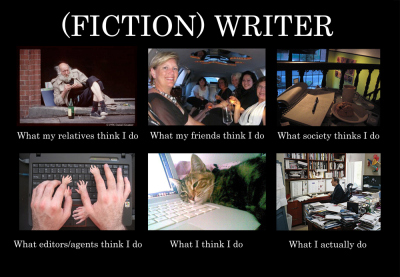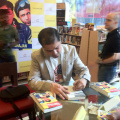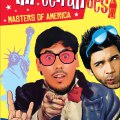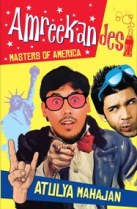Reflections on two Years of Writing
It’s been two years since my first book got published. It was a dream I had seen, to get published, to see my name on book shelves, to be able to tell a story I wanted to share, to reach out to the world and, ahem, to be famous.
It didn’t take much time to realise that breaking into the hallowed ranks of published authors is not easy in a competitive industry where the top publishers get hundreds of manuscripts a month and getting noticed in that big pile might just be a matter of luck. Luckily I got signed up by one of the major publishing houses. Chicken as I was, I signed on the dotted line without as much as daring to ask for an advance higher than the half-dozen peanuts being offered. In my mind, I was sure that I was going to sell many more books so the advance was anyway immaterial.
How naive I was.
You jump into the field without any idea of how it works, and boom, you crash-land on your head straight into the grand palace of your dreams you had imagined to be lined with hundreds of thousands of books sold, mile-long lines of adoring fans waiting to get a glance of your stubbled face, journalists scampering for a sound-bite and so on. I was in for a rude shock.
If you’re an author, repeat after me: Books don’t sell themselves. (Except maybe if you’re Jhumpa Lahiri.)

Like every new author I used to think that I had a masterpiece on my hands. A great story, the publisher loved it, the few friends who read it had great things to say about it, this book was going to sell like hot cakes. Ten thousand. Twenty thousand. If things go really well, maybe fifty thousand copies.
On the day of the formal book release, me and the missus eagerly went to the market to check out the bookstores, no doubt in our minds that they would be cutting ribbons, opening champagne bottles and telling the world about this great new book that just got released today.
‘Amreekandesi? Never heard of it.’ Was the polite answer from the sales person. He patiently checked the computer and confirmed. ‘No we don’t have it.’
‘But it was supposed to be released today.’
He smiled benevolently and turned his attention to the next person in line.
The few days for this particular store turned out to be about two months, when I excitedly stood next to the ‘new arrivals’ shelf and got a picture taken, as documentary proof. Unfortunately, the next weekend, the book was not there anymore. It had been relegated to the interiors of the store, a lone copy for anybody who could find it. Disappeared faster than an Abhishek Bachchan movie.
Every day I would excitedly open up the papers and check if a review of my book had been published. The publishers had told me that they had sent a copy to every newspaper, so it had to be a matter of time before this happened.
Ouch.
The first time I heard the term ‘Commercial Fiction’ was at a meeting with the publicist to go over the marketing plan. I casually asked her when she expected the newspapers to start getting flooded with reviews of my awesome debut and she looked at me with the sort of look Rahul Gandhi’s teachers must have given him when he turned in his math assignments and said, ‘oh you know, generally they don’t review commercial fiction.’
You know how in TV mythological serials there used to be the sound of loud thunder followed by the screams of someone getting stomped upon by a giant elephant. Yes I could hear such screams coming from somewhere deep within my gall bladder at that moment.
‘Commercial fiction?’ I managed a meek question over the cacophony inside.
‘Oh yes, newspapers generally review more, you know, literary fiction. They don’t cover a lot of Indian writing.’
Twin blows within seconds. The tower of my dreams was fast crashing down.
Commercial fiction. Second-grade fiction. Lesser cousin of real writing, the literary one.
I have come to realise in these two years that the Commercial vs. Literary divide is much like the one between fans of Salman and Shahrukh, and the twain shall never meet.
And book reviewers - they are like mothers-in-law, except even mothers-in-law are nicer. Never forget to count your blessings if they bestow upon you the honour of reviewing your ‘commercial’ book, an act far beneath their dignity. I have optimistically sent copies of both books to plenty of literary types but they remain as silent as our former Prime Minister. Authors are a dime a dozen these days. If you want to become a tantrum-throwing celebrity, try becoming a book reviewer.
Maybe if my name was Atulya ‘Banerjee’, people might have treated me with a little more respect. Because if there’s one thing that ensures success in literary circles, it is being Bengali. They say well begun is halfway done; In Indian literary circles that ‘well begun’ refers to being a Chatterjee or Ghosh. If your book talks of the Calcutta of the 1980s with vivid descriptions of squalor and slow-moving trams, then boss, you’ve hit the jackpot. If there’s NRIs and a few deaths across continents and/or generations, then you should start preparing that Booker acceptance speech.
Like a James Bond Martini (shaken but not stirred), I told myself that I can live without the support of the literary folks and newspaper reviews, as long as the common people like me who haven’t grown up on books written by Tolstoy and Alice Munro, read and appreciate my work.
But there too is a glass ceiling for us lesser mortals. The Bookstore.
Now here’s the problem. Bookstores are an endangered species struggling to survive in times of Flipkart and Amazon. They can only make profits by selling books that people want to read, by which I mean Chetan Bhagat (after all he knows What Young India Wants), the source of unimaginable heartburn to the earlier-mentioned literary types. Bookstores won’t sell new writers because nobody knows them, and nobody would know new writers till they see their books in stores.
A classical dilemma. If you are lucky enough to get your copies into a store, you probably get a week to make an impression. If they don’t sell by then, well, better luck next time. Try writing a book that has a half-dozen exclamation marks in its title. Might just work with the young audience.
And this leads us to the world of marketing. With increasingly frustrated authors willing to offer sexual favours in return for a place on the shelf, there was a great opportunity for bookstores. So now you can shell out moolah for stores to give prominence to your book. Like the good people at MasterCard say, there’s some things money can’t buy. Making your books available in stores isn’t one of them. Which also means that those that don’t want to spend the money have no hope in hell.
Another thing I realised after becoming a writer was just how much writers value public feedback. I have spent months refreshing the Amazon or Goodreads page of my books checking for new reviews every few hours. As a reader one doesn’t appreciate the amount of effort that goes into creating a book. It is typically more than a year of hard work, time spent in solitary confinement, time spent ignoring your family, carefully going over 70,000 words iteration after iteration, painstakingly searching for that misplaced comma, fighting with the editor when she reworks a sentence thereby changing the meaning altogether. After all that effort, if you can’t make it to the hallowed bestseller lists, feedback from readers becomes the source of small joys that keep you going.
Talking of bestseller tags, I have seen authors proclaim their book as a bestseller when it spends an hour in the top-10 an obscure sub-category of Amazon. Yeah sure. That’s a bestseller alright.
After coming from the much more structured world of technology, the publishing industry seems like organised chaos. Everything, from publishing decisions to sales stats seems as arbitrary as Arvind Kejriwal’s allegations against his various enemies. You need a skin thicker than the walls of Delhi’s Red Fort if you want to survive. There was that famous agent who said no to representing Amreekandesi, then said yes and said we should fill it up with sex and such, and then again said no, all in the space of a few hours. He didn’t bother replying to me a year later when I wrote about Democrazy. There was this famous magazine that asked me to write a column for them, then kept pushing it out three months at a time, and now one year later it never happened and the editor has stopped taking my calls. There was another editor…forget it, this could take time. I think my blood pressure just shot up.
I have had my moments. There was a phone call from an old friend’s mom all the way from London where she said that Amreekandesi brought a smile to her face because so much of it resonated with her journey as an immigrant. I have had my fair share of fan mail from strangers writing in to say good things about my work. Writing has given me a lot of love and support from readers, and I will forever be grateful for that.
Writing may be frustrating, writing may be too little reward for too much effort, but I’ll keep writing. I’ll keep writing not for money, not for awards or bestseller tags, but for the satisfaction from seeing the smile on someone’s face after reading my work, for the generous praise when something I wrote touches a reader’s heart, for the feeling of being able to give outlet to my thoughts and experiences, for the thought that I may be making a difference to someone’s life in whatever little way.
As for the literary types, let’s see how long they ignore me. I’ll just keep getting better with each book. I am not going anywhere, baby.
Also, a little announcement. As a little gesture of giving back to the community, I am going to donate everything I have made from my first two books to charity. Because love needs to be shared.







Getting a book published itself is something that negates whether it is a best seller or not, your book is a little piece of yourself you leave behind for all eternity :)
And great gesture right there Atulya! Soldier on! All the best :)
Thanks Vinod :)
Nice piece of writing describing the pains of writers.
This is so sweet. Love it :)